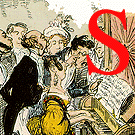[The following passage comes from the author's Life of Robespierre (1849) in the Hathi Digital Library Trust web edition. — George P. Landow]
 torms
lower on the horizon: they are met with epigrams! Dandy
abbés make their lacqueys repeat the breviary for them,
and having thus discharged the duties of their office, set
themselves with all seriousness to turning couplets, and to
gaining the reputation of gallantry. Women of the
highest rank go to hear mass; but take with them, under
guise of prayer-book, some of those witty and licentious
novels, which are to be compared only to the Satyricon
of Petronius.
torms
lower on the horizon: they are met with epigrams! Dandy
abbés make their lacqueys repeat the breviary for them,
and having thus discharged the duties of their office, set
themselves with all seriousness to turning couplets, and to
gaining the reputation of gallantry. Women of the
highest rank go to hear mass; but take with them, under
guise of prayer-book, some of those witty and licentious
novels, which are to be compared only to the Satyricon
of Petronius.
These charming women "violated all the common duties of life, and gave very pleasant little suppers" [Sydney Smith]. They had effaced the negative from the seventh commandment, and made marriage, as the witty Sophie Arnould felicitously defined it "the sacrament of adultery."
The treasury was drained to enrich favourites . . . Society never exhibited greater contrasts, nor greater anarchy; old creeds and ancient traditions were crumbling away; and amidst the intellectual orgies of the epoch, the most antagonistic elements had full play. D'Alembert, Lalande, Lagrange, Buffon, and Lavoisier, were jostled by Cagliostro, Mesmer, Saint Martin, and Weishaupt: the exact sciences had rivals in the wildest chimeras and quackeries. Atheists proclaimed, with all the fervor of conviction, their faith in the eternal progress of humanity; sceptics, who assailed Christianity with all the powers of mockery and logic, were the declared apostles of the three fundamental principles of Christianity: the principles of charity, fraternity, and equality. Voltaire attacked all sacred institutions, devoting himself to écraser l’infame. Montesquieu examined, with no reverent spirit, the laws of every species of established government. Rousseau went deeper still, and struck at the root of all society by a production as daring as it was well-timed, the "Discours sur l’inegalité." [14, 17]
The most careless observer could not fail to perceive the heavy thunderclouds which darkened the horizon of this sunny sky. The court and the salons were not France; they occupied the foremost place upon the stage, but another actor was about to appear, before whom they would shrink into insignificance; that actor was the People. The people became the fashion. Philanthropy was de bon ton. The philosophers speculated about the people; the litterateurs declaimed about them. Courtiers played at being peasants. A village was constructed at Trianon; village fetes were given at royal farms by royal peasants. Idylls were a la mode. Florian, Gessner, and Paul el Virginie were the flowers of this peasant literature. As in our own day we see some aristocratic writers joining with the most democratic in the senseless laudation of that grandiose abstraction—"The People,"—so in unhappy France the warmest eulogists of the starved, uneducated, uncared-for masses, were those who profited by their subjection. Restless, unbelieving, sick at heart of the existing state of things, they played at being peasants and poetised the people!
Among the philosophic nobles, there were some who quitted their talons rouges to wear thick shoes; and relinquished their costume to put on that of the bourgeoisie. It was very dangerous work playing thus with their dignities when those dignities were already tottering! Few were in earnest, because few had convictions. At length a man arose in whom pretence grew into seriousness, paradoxes ripened into convictions: that man was Rousseau.
Bibliography
Lewes, George Henry. The Life of Maximilien Robespierre; with extracts from his unpublished correspondence. London, Chapman and Hall, 1849. Hathi Digital Library Trust online version of a copy in the Harvard University Library. Web. 25 April 2017.
Last modified 28 April 2017